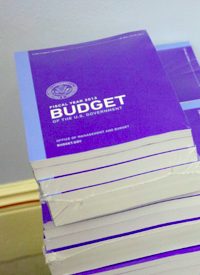
Obama claims that his $3.8-trillion budget is the first of many budgets that will eliminate $4 trillion in deficit spending over the next decade. Of course, as always, only the current year’s budget counts — and sometimes even it doesn’t matter; the Senate has failed to pass a budget for over 1,000 days, yet the government keeps plugging away — so any alleged deficit reduction beyond 2013 is meaningless.
In fact, given Obama’s track record on deficits, only the most naïve would believe that his rosy forecasts of stemming the flow of future red ink are likely to pan out. The President promised to cut the deficit in half during his first term; instead, his proposed fiscal 2013 deficit would be the fourth consecutive shortfall to top $1 trillion. Even his recent projections have proved faulty, as the Washington Post observes:
The president’s outlook for debt reduction has slid markedly since September, when Obama told Congress that his proposals would hold annual deficits well under $600 billion after next year and permit the debt held by outside investors to rise to $17.7 trillion by 2021, or 73 percent of the overall economy.
The new 10-year blueprint shows annual deficits exceeding $600 billion every year except 2018. And the portion of the debt held by outside investors would grow to $18.7 trillion by 2021, or 76.5 percent of the economy — a full $1 trillion higher.
If Obama can’t forecast a mere five months into the future with any degree of accuracy, why should anyone take his 10-year projections seriously?
The first anti-deficit weapon in Obama’s arsenal is tax increases. The President is asking for $1.5 trillion in tax hikes, with households making over $250,000 a year bearing the brunt of them. Primarily Obama is seeking an end to the George W. Bush tax cuts for high-income households. He is also asking that dividends be taxed as ordinary income, up to the top marginal rate of 39.6 percent, instead of at the current, special rate of 15 percent. He wants to extract $61 billion from big banks supposedly to recoup the cost of the financial bailout and, in turn, to bail out homeowners facing foreclosure. And he continues to push for the so-called “Buffett Rule,” whereby anyone making over $1 million a year must forfeit at least 30 percent of it to Uncle Sam.
These tax increases all have their problems, foremost of which is that they transfer money from the productive private sector to the parasitic public sector, where the money will be used not to meet consumers’ needs but to buy politicians votes. Then there is the matter of getting Congress to agree to the hikes, something it has been loath to do for years, even when Democrats were in charge of both chambers.
Obama’s second line of deficit attack is cutting spending, which he says his proposal will do to the tune of $2.5 trillion over 10 years. However, notes Veronique de Rugy at National Review Online, “cutting spending in this case means that the president will plan to increase spending less that [sic] what he had hoped for in the past.” Explains de Rugy: “The president is requesting an increase in spending every single year. In the next ten years, spending will go up by over $2 trillion, from $3.7 trillion in FY 2012 to $5.8 trillion in FY 2022. In fact, he is even requesting more spending for FY 2013 than he requested in last year’s budget.” Some “cuts”!
Obama engages in other trickery, claiming that he is saving $850 billion by virtue of withdrawing troops from Iraq and Afghanistan. The underlying assumption is that the $850 billion was going to be spent on those wars in the first place when, in fact, the plan has long been to reduce troop levels and concomitant costs in those two countries. Obama is therefore projecting ahead war spending that was never going to happen just so he can turn around and claim to have saved that money by not spending it after all. Did the President, perhaps, consult the ghost of Lewis Carroll while drawing up his budget blueprint?
Other supposed savings in Obama’s budget come from future cuts in Medicare and Medicaid, “mainly through reduced payments to health care providers,” according to Politico. Seeing as how Congress has routinely overridden such scheduled reductions in the past, the chances that they will occur in the future — even if the targets are drug companies, hospitals, and nursing homes rather than doctors — are fairly slim. Other than that, entitlements, the real drivers of the deficit, are more or less off limits in Obama’s plan.
The President expects to save $407 billion in interest on the debt; but as de Rugy points out, “if the spending cuts aren’t real, we shouldn’t count on lower interest payments.”
Despite all his talk of cutting spending, Obama is also calling for brand new outlays. Among his requests: $125 billion for transportation projects, $350 billion for economic stimulus, $8 billion for community college job-training programs, and $6 billion for improving the energy efficiency of homes. Conveniently, a significant portion of this spending would be categorized as mandatory rather than discretionary, thereby keeping it “outside the appropriations caps set last summer,” Politico writes. Again the President’s alleged commitment to reining in the deficit is revealed as a fraud.
In addition, reports Reuters, Obama wants to spend $800 million on economic aid to “Arab Spring” countries, most of which of would be part of a “Middle East and North Africa Incentive Fund” that the White House says would “provide incentives for long-term economic, political, and trade reforms to countries in transition — and to countries prepared to make reforms proactively.” All of this spending is, of course, unconstitutional, and the foreign aid is Obama’s way of bossing around its beneficiaries — a good way to make more enemies for the United States.
Congressional Republicans derided Obama’s budget proposal as pure politics. Republicans on the Senate Budget Committee even issued a statement saying that Obama was engaging in “monumental deception” and that “fiscal sleight-of-hand accounts for $3.7 trillion of the president’s deficit reduction, leaving the debt in the president’s plan largely unchanged from what would be expected to occur under current spending law and tax policies.” No wonder Politico was moved to remark that Obama’s budget “seem[s] borderline delusional to his critics given the debt accumulated by Washington.”
Obama’s proposal is nothing but the usual inside-the-Beltway gimmickry disguised as deficit reduction. The good news, according to CNN political analyst Alan Silverleib, is that it isn’t likely to become law: “It’s all about election year 2012, not fiscal year 2013.” The bad news is that whether it passes or not, there seems to be little appetite in Washington for bringing the budget into line with fiscal reality.
Photo: AP Images



